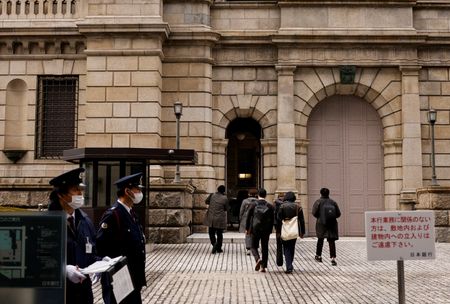 1
1 1
1
By Leika Kihara and Takahiko Wada
TOKYO (Reuters) – The Bank of Japan (BOJ) may abandon a controversial bond yield cap this year if risks clouding the outlook, such as global banking sector woes, subside, Toshihiro Nagahama, an economist who participated in a key government panel, told Reuters.
Nagahama, who was invited to speak at the panel’s special session on economic policy held May 15, said Japan must avoid removing monetary and fiscal support prematurely to ensure recent positive signs in wage and consumption are sustained.
Until there is clarity that wages will keep rising steadily next year, the BOJ must hold off raising its short-term interest rate target from the current level of -0.1%, he said in an interview on Wednesday.
As long as short-term borrowing costs are kept low, however, the central bank could remove a 0.5% cap set on the 10-year bond yield without causing too much damage to the economy, said Nagahama, an economist at Dai-ichi Life Research Institute.
The BOJ will probably wait until concern over global banking sector woes and the U.S. debt ceiling standoff eases, he said.
“Once such risks subside and markets remain calm, the BOJ may tweak yield curve control,” Nagahama said. “I won’t be surprised if such a move occurs this year.”
As part of efforts to reflate the economy and sustainably push inflation to its 2% target, the BOJ guides short-term rates at -0.1% and pledges to guide the 10-year bond yield around 0% under a policy dubbed yield curve control (YCC).
In December, the BOJ raised the cap to 0.5% from 0.25%, after being forced to ramp up bond buying to defend the ceiling against investors betting on a near-term tweak to YCC.
The 10-year Japanese government bond yield has recently hovered around 0.4%, after the BOJ took a range of steps to counter market attacks against the cap.
With inflation exceeding its 2% target, markets are simmering with speculation the BOJ will remove or raise the 0.5% yield cap that has drawn criticism for distorting market pricing.
BOJ Governor Kazuo Ueda said last week the central bank was unwavering in its commitment to maintain ultra-loose policy, ruling out the chance of a near-term tweak to YCC.
(Reporting by Leika Kihara; Editing by Sam Holmes)